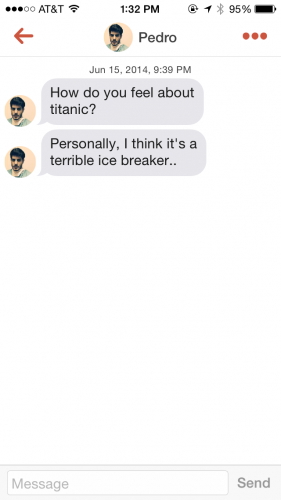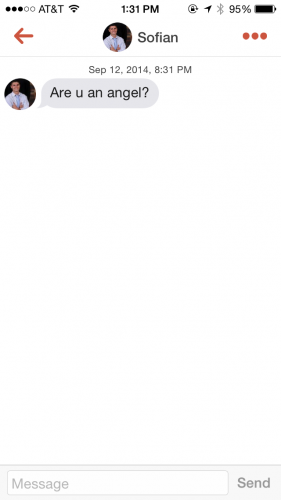By SAMANTHA BELL
October 2, 2014
The newest fad in online dating may not feel like dating at all.
Offering an array of potential matches that feels more like a party game than a quest for a fairy-tale romance, Tinder, a free mobile app, is taking the online dating world by storm.
That online dating space has seen its fair share of companies come and go, and few have been able to give the usual suspect — like eHarmony and OkCupid — serious competition.
Since bursting on the scene in September 2012, however, Tinder has quickly emerged as the next digital dating (or should it be hookup) giant.
Tinder has pulled in people by offering a place to do all the things users love doing online, but won’t admit to: make quick judgments based on looks, our own and those of others. It’s the ultimate in an electronic ego boost.
“People don’t think of it as online dating, they think of it as a game,” said Liz Pennington, a senior at Ramapo College who downloaded the app last year after hearing about it from friends at other schools. “I use it when I’m bored and it’s convenient having it right on my phone. I didn’t think it would catch on, but it’s actually really addictive.”
The Recipe for Success
Created by the University of South California graduates Sean Rad and Justin Mateen, Tinder is all about first impressions.
Using the same formula behind Hot or Not, Tinder allows users to search for a date by swiping through Facebook-connected profiles of prospective matches, accepting or rejecting based on visual appeal and a terse 500-character bio.
Guy On Tinder Ridiculously Explains What Life With Him Would Be Like: http://t.co/it6TaXpZ2e pic.twitter.com/9YugKTlXfS
— Elite Daily (@EliteDaily) September 30, 2014
The design is simple: user profiles display up to five pictures, a first name, age, distance away, mutual friends and mutual interests. Users can reject a potential match with the swipe of their finger to the left, or approve with a swipe to the right — an act as swift as glancing at someone at a bar or in a coffee shop, no conversation necessary.
The main thrill is the lack of rejection; each swipe is kept anonymous until a mutual match is made, announced by a notification to initiate a private conversation.
Sure, it may seem superficial, but its game-ified approach to flirting has taken off on college campuses. It was first launched at a U.S.C. party and multiplied from there, there being, of course, California.
According to Marketing Land, Tinder’s founder and chief executive Sean Rad said in February 2014 that the app was recording 750 million “swipes” per day that lead to 10 million matches daily, up from 5 million matches in December 2013.
Judging on Tinder is “mostly based on looks,” said Renee Bruno, a senior at Ramapo who uses the app frequently. “I think it’s definitely part of the appeal, though.”
The app has used technology to help communicate mutual feelings between people — because of our social norms and insecurities, people tend to guard their true feelings.
Tinder offers the digital equivalent of stepping into a party and immediately knowing if the people you instantly find attractive feel the same way about you.
“It’s become sort of an ego boost,” Bruno said. “I first downloaded it to see what all of the hype was about — then I found myself not being able to take my eyes off the screen.”
More, More, More
According to The Financial Times, research has shown that “likes” on Facebook and retweets on Twitter can release a dopamine surge that can sometimes lead to social media addiction.
As it turns out, researchers say that receiving and answering a notification results in a hit of dopamine, a chemical neurotransmitter associated with the motivation and reward response in the human brain.
Tinder’s popularity stems from its ability to match the human evolutionary mechanism http://t.co/EVfZEtE4lq — Social Media Insider (@SocialMedia411) September 28, 2014
Dopamine controls the pleasure systems of the brain and makes you feel enjoyment, pleasure which can motivate you to seek out certain behaviors, such as food, sex and drugs — or all three.
Social media notifications can have the same effect. While Facebook tells you if someone liked your status update, Tinder tells you if someone likes you, really likes you.
With each match comes instant gratification, feeding an emotional high.


This story was really great. I really enjoyed all the pictures or screen shots of the app. It helped to break down the story and also made it visually appealing. I also liked how you not only talked about the app, but mentioned the effect it has on people by releasing dopamine. It was also good that you mentioned the hot or not app to compare it to something.
One thing I would have liked to see is a quote from someone who might not have liked the app and why.